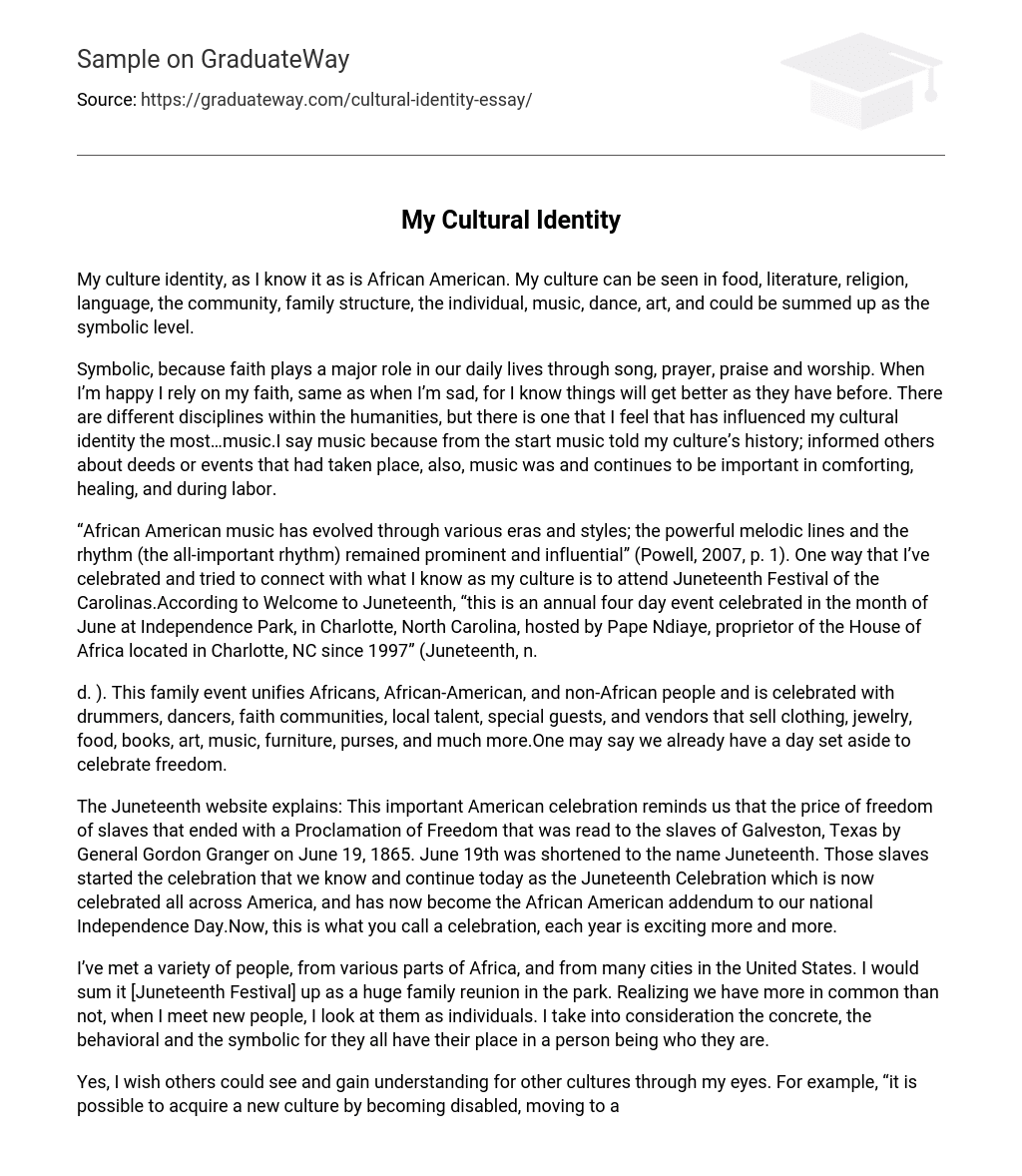My cultural identity is African American, which is evident in many areas of my life such as food, literature, religion, language, community, family structure, individuals, music, dance, art, and symbolism.
Symbolic, faith plays a crucial role in our daily lives through song, prayer, praise, and worship. Regardless of my emotional state, my faith brings me comfort and hope as I am aware of past improvements. Among the various disciplines within the humanities, music has had the most profound impact on shaping my cultural identity. It serves as a medium for sharing my culture’s history, recounting important events, and offering solace, healing, and support during labor.
“African American music has evolved through different eras and styles, with the melody and rhythm remaining prominent and influential” (Powell, 2007, p. 1). To connect with my culture, I have attended the Juneteenth Festival of the Carolinas. This event takes place annually for four days in June at Independence Park in Charlotte, North Carolina. The festival is hosted by Pape Ndiaye, the owner of the House of Africa located in Charlotte since 1997″ (Juneteenth, n.
Juneteenth brings together Africans, African-Americans, and people from various backgrounds in a celebration that emphasizes family. The event showcases drummers, dancers, faith communities, local talents, special guests, and vendors offering an array of products like clothing, jewelry, food, books, art music furniture purses and more. Some argue that we already have a dedicated day to honor freedom.
The Juneteenth website explains that Juneteenth is a significant American celebration which marks the liberation of slaves. It originated from General Gordon Granger’s Proclamation of Freedom, read to Galveston, Texas’ enslaved population on June 19, 1865. This date came to be known as Juneteenth and initiated the Juneteenth Celebration, organized by the newly freed slaves and now observed throughout America. It has since become an African American addition to our national Independence Day. The website further highlights that this celebration gains more excitement with each passing year.
Encountering individuals from diverse regions in Africa and various cities in the United States at the Juneteenth Festival felt like a massive family reunion in the park. It highlighted how we have more similarities than differences, prompting me to perceive each new person I meet as a distinct individual. Their tangible qualities, actions, and symbolic representations all play a role in shaping their identity.
The text highlights the desire for others to see and understand different cultures from one’s perspective. It suggests that a new culture can be acquired through various means, such as becoming disabled, moving to a different country or region, or experiencing a change in economic status. This broader understanding of culture reveals that individuals can belong to multiple cultures simultaneously. Exploring the Lumbee tribe, it states that they are the largest and most prosperous Indian tribe in North Carolina since the 1700s. Their name is derived from the Lumbee River, located in Robeson County.
The Lumbee people have been acknowledged by the state of North Carolina since 1885. They created a distinct school system called Croatan Normal Indian School, which is now known as The University of North Carolina at Pembroke. I believe that the Lumbee culture has left a lasting impact on the world, as they have successfully preserved their heritage, which remains vibrant today.
The mascot of my middle school and high school was an Indian, but it has since been changed because of the civil rights issues that the Native Americans fought for. The Lumbee tribe faced their own challenges but did not experience the forced migrations that other tribes went through. This was because of their mixed-race status and early agreements with various government bodies to prevent displacement and injustice (The Lumbee Tribe of North Carolina, n. . ).
According to Whirty (2007), the Lumbees frequently welcome people from outside their community. The Lumbee tribe places importance on close family ties and maintains cultural traditions such as allowing elders to lead decision-making, participating in marriages within the tribe, and organizing an annual week-long homecoming celebration (The Lumbee Tribe of North Carolina, n.d.).
In summary, it is important to embrace and learn from one’s cultural background, regardless of origin. The Lumbee tribe demonstrates that challenges may arise to undermine cultural identity, but individuals can choose to preserve or diminish it. Personally, I appreciate the United States for its diverse fusion of cultures and biracial families. This diversity holds great significance because, ultimately, we share more similarities than differences.
According to the Community Tool Box in 2013, it was noted that we all belong to multiple cultures simultaneously. As a Registered Nurse, my commitment is to deliver outstanding care to every patient, regardless of their cultural background, as it is inconsequential. What truly matters is that everyone is an individual and Christ encompasses all.





